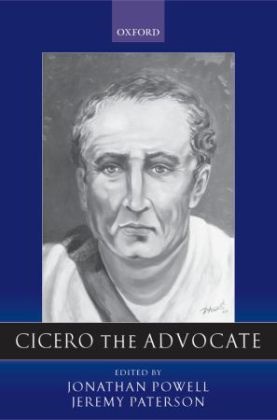Read more
Zusatztext Skilled editors and a team of experts offer what is effectively an `Oxford Companion to Cicero's Forensic Speeches' - and a boon companion it is . . . Highly recommended. Informationen zum Autor Jonathan Powell is Professor of Latin, Royal Holloway, University of London.Jeremy Paterson is Senior Lecturer in Ancient History, University of Newcastle upon Tyne. Klappentext This is the first book in English to take Cicero's forensic speeches seriously as acts of advocacy! i.e. as designed to ensure that the person he represents is acquitted or that the person he is prosecuting is found guilty. It seeks to set the speeches within the context of the court system ofthe Late Roman Republic and to explore in detail the strategies available to Roman advocates to win the votes of jurors. The volume comprises a substantial introduction! fourteen chapters by prominent Ciceronian scholars in Britain! North America! and Germany! and a final chapter by a currentBritish Appeal Court judge who comments on Cicero's techniques from the point of view of a modern advocate. The introduction deals with issues concerning the general nature of advocacy! the Roman court system as compared with other ancient and modern systems! the Roman "profession" of advocacy andits etiquette! the place of advocacy in Cicero's career! the ancient theory of rhetoric and argument as applied to courtroom advocacy! and the relationship between the published texts of the speeches as we have them and the speeches actually delivered in court. The first eight chapters discussgeneral themes: legal procedure in Cicero's time! Cicero's Italian clients! Cicero's methods of setting out or alluding to the facts of a case! his use of legal arguments! arguments from character! invective! self-reference! and emotional appeal! the last of these especially in the concludingsections of his speeches. Chapters 9-14 examine a range of particular speeches as case studies--In Verrem II.1 (from Cicero's only major extant prosecution case)! Pro Archia! De Domo Sua! Pro Caecina! Pro Cluentio! ProLigario. These speeches cover the period of the height of Cicero's career! from70 BC! when Cicero became acknowledged as the leading Roman advocate! to 49 BC when Caesar's dictatorship required Cicero to adapt his well-tried forensic techniques to drastically new circumstan Zusammenfassung Cicero's courtroom speeches are the most significant examples we have of the art of the ancient Roman advocate. This collection of essays aims to set them in the context of the Roman legal system and of ancient techniques of persuasion, and to compare their methods with those available to modern advocates. Inhaltsverzeichnis Introduction I. Themes 1: Andrew Lintott: Legal Procedure in Cicero's Time 2: Jeremy Paterson: Self-Reference in Cicero's Forensic Speeches 3: Kathryn Lomas: A Volscian Mafia? Cicero and his Italian Clients in the Forensic Speeches 4: David Levene: Allusion in Cicero's Narratives 5: Jill Harries: Cicero and the Law 6: Andrew Riggsby: The Rhetoric of Character in the Roman Courts 7: Christopher Craig: Audience Expectations, Invective, and Proof 8: Michael Winterbottom: Cicero's Perorations II. Case Studies 9: Catherine Steel: Being Economical with the Truth: What Really Happened at Lampsacus (Verrines II 1) 10: Lynn Fotheringham: Repetition and Structure in a Civil Law Speech: The Pro Caecina 11: Christopher Burnand: The Advocate as a Professional: The Role of the Patronus in Cicero's Pro Cluentio 12: Dominic Berry: Literature and Persuasion in Pro Archia 13: Wilfried Stroh: De Domo sua: Legal Problem and Structure 14: Jeff Johnson: The Dilemma of Cicero's Speech for Ligarius Epilogue 15: John Laws: Cicero and the Modern Advocate ...

